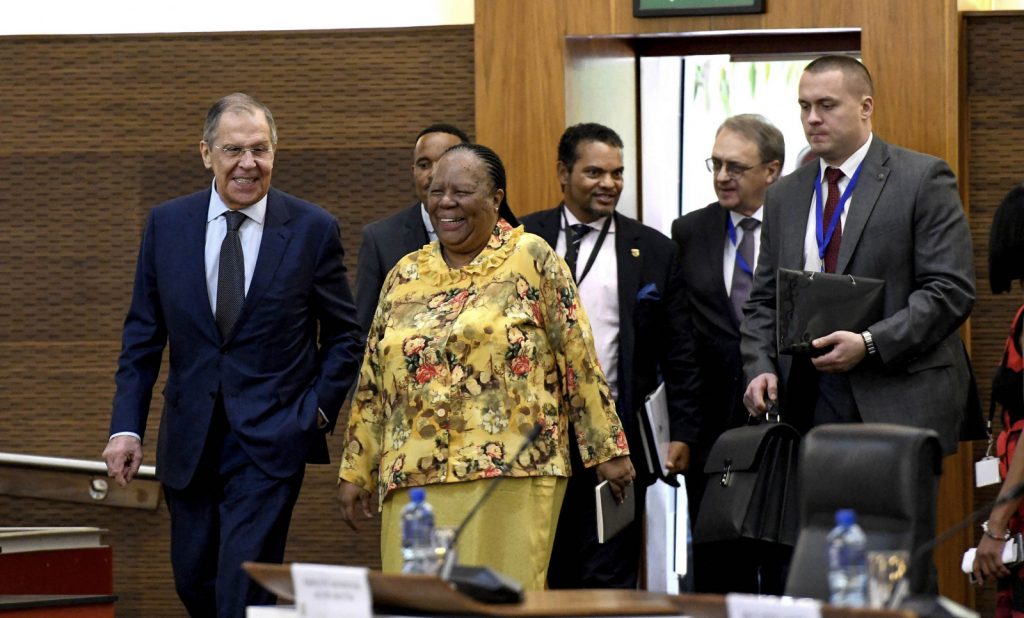Grounded: A Russian Air Force plane at Waterkloof in Pretoria. Russia’s state-owned energy company Rosatom tried to get a nuclear deal with South Africa. Photo: Emmanuel Croset/AFP
NEWS ANALYSIS
When Russia’s foreign minister, Sergei Lavrov, visited South Africa, eSwatini, Angola and Eritrea last week, he dwelt at length on the historical ties between Russia and the African continent.
The Soviet Union — the superpower that President Vladimir Putin appears intent on resurrecting — played an active role in supporting liberation movements in this part of the world.
For that reason, doors here will always open to representatives from Moscow. Western diplomats who take exception to this, laying claim to some moral high ground, appear to have short memories.
But for all the glad-handing and photo ops — perhaps Naledi Pandor, South Africa’s foreign minister and the one who initially condemned Russia’s invasion of Ukraine, did not need to be quite so effusive in her welcome — the hard truth for Russia is that it is struggling to find meaningful African allies.
Eritrea and eSwatini are small, isolated regimes with little diplomatic clout. In the bigger picture, their support is meaningless. Angola is richer and more politically significant, but still carries little weight on the international stage.
Tellingly, Botswana, which was initially on the foreign minister’s itinerary, cancelled at the last minute without explanation.
South Africa is the big prize. This is the continent’s second-richest economy, and its most influential in the diplomatic arena by virtue of its membership of the G20 group of countries and the Brics alliance (which also includes Brazil, Russia, India and China).
The planned exercises in mid-February between the navies of South Africa, Russia and China are an undoubted propaganda coup for the Russian regime, and will be spun as a show of support for Moscow’s illegal invasion of Ukraine.
Nonetheless, South Africa’s relationship with Western countries is far stronger.
Economically, there is no comparison. South Africa’s trade with Russia amounted to a little over $1 billion in 2021, compared to $21 billion with the United States. Militarily, South Africa’s armed forces regularly conduct large-scale exercises with the US and European Union member states (such as Operation Shared Accord in July last year, in which 700 South African and American troops trained together “to improve bilateral military interoperability”).
Diplomatically, there is extensive cooperation between Pretoria, Brussels and Washington DC. It was only four short months ago that President Cyril Ramaphosa was in Washington to meet his American counterpart. The pair struck up such an instant rapport that Joe Biden abandoned the planned programme to give Ramaphosa a personal tour of the West Wing.
 Whistle-stop tour: Minister of International Relations and Cooperation Naledi Pandor with her Russian counterpart, Sergei Lavrov (far left), who briefly visited South Africa last month.
Whistle-stop tour: Minister of International Relations and Cooperation Naledi Pandor with her Russian counterpart, Sergei Lavrov (far left), who briefly visited South Africa last month.
This was in stark contrast to Ramaphosa’s last meeting with Putin in 2019, at the Russia-Africa summit in Sochi, in which Putin pestered him to sign a multibillion-dollar deal for nuclear plants to be built by Russia’s state-owned energy company, Rosatom.
This proposed deal, first brokered in secret by Ramaphosa’s predecessor, Jacob Zuma, has been mired in corruption allegations, and Ramaphosa was having none of it in Sochi. Looking a little exasperated, he told South African journalists: “We have met a few times and each time the nuclear issue comes up. I said we are not about to embark on a nuclear power project we cannot afford.”
So for all the talk of historical ties, today’s Russia has not been able to get what it wants from South Africa. That’s why, despite public pronouncements of concern, Western diplomats are not especially worried about where South Africa’s loyaltiesmay lie.
“We think working with the Russian navy is not the best look for a country that is trying to say they are neutral,” said an official in the US state department. “But we also understand politics.”
Without much in the way of economic or diplomatic leverage, Moscow’s only play is in the military sphere, in particular through the activities of the Wagner mercenary group.
Wagner is active in the Central African Republic, Mali and Sudan, but its military footprint in Africa is tiny compared to that of the US, which maintains an extensive network of secret military bases across about half of Africa’s countries.
A 2020 investigation by The Continent found that on any given day there are some 6 000 American troops operating from at least 27 military outposts in Africa — and those are just the ones that could be verified.
Far from underscoring the strength of Russia’s ties with Africa, Lavrov’s whistle-stop African tour merely highlighted just how fragile its influence on the continent has become. Ironically, his emphasis on the Soviet Union’s ties with Africa — which were far deeper and more meaningful — served only to emphasise this fragility.
This article first appeared in The Continent, the pan-African weekly newspaper produced in partnership with the Mail & Guardian. It’s designed to be read and shared on WhatsApp. Download your free copy here